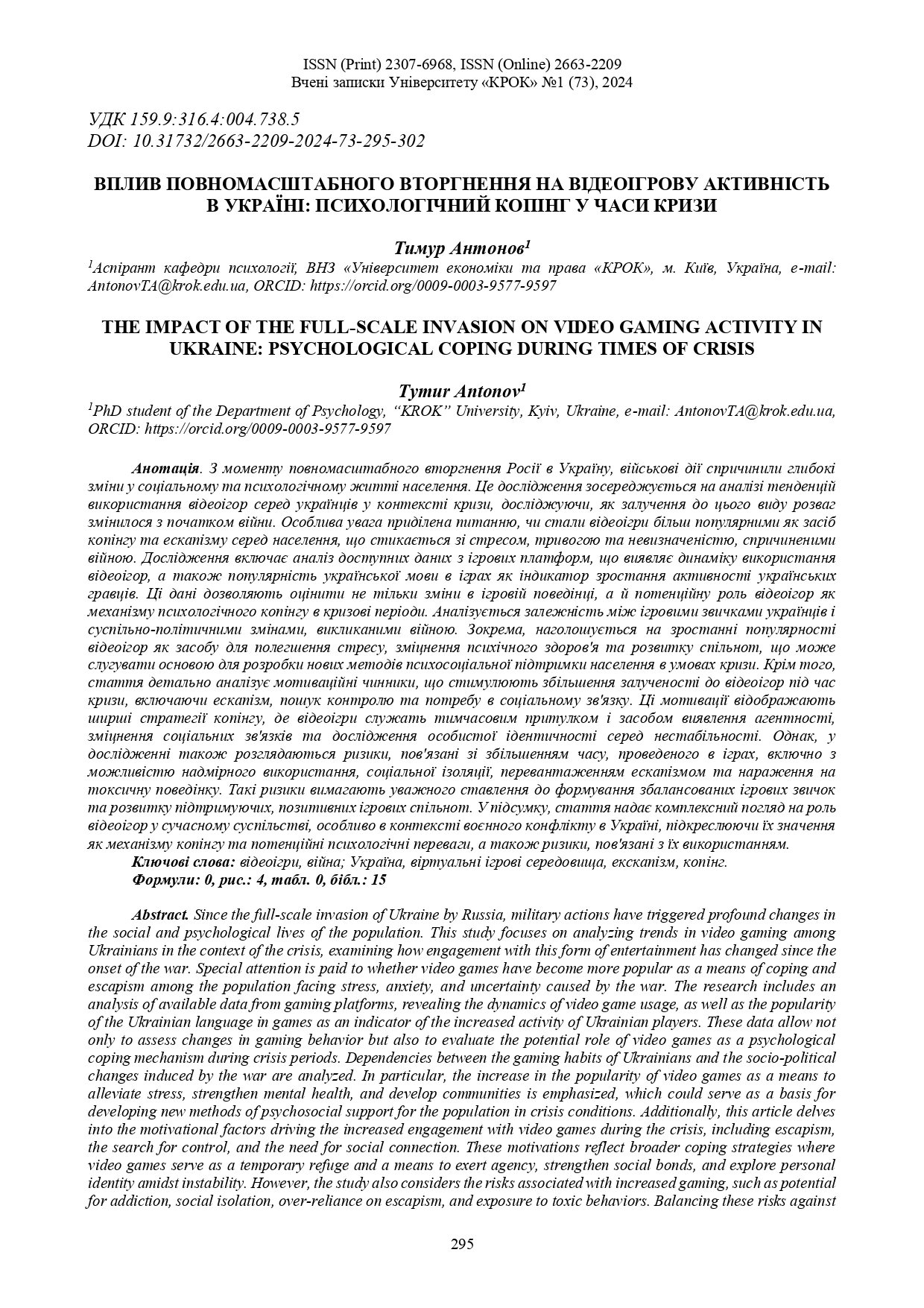THE IMPACT OF THE FULL-SCALE INVASION ON VIDEO GAMING ACTIVITY IN UKRAINE: PSYCHOLOGICAL COPING DURING TIMES OF CRISIS
DOI:
https://doi.org/10.31732/2663-2209-2024-73-295-302Keywords:
video games, war, Ukraine, virtual gaming environments, escapism, copingAbstract
Since the full-scale invasion of Ukraine by Russia, military actions have triggered profound changes in the social and psychological lives of the population. This study focuses on analyzing trends in video gaming among Ukrainians in the context of the crisis, examining how engagement with this form of entertainment has changed since the onset of the war. Special attention is paid to whether video games have become more popular as a means of coping and escapism among the population facing stress, anxiety, and uncertainty caused by the war. The research includes an analysis of available data from gaming platforms, revealing the dynamics of video game usage, as well as the popularity of the Ukrainian language in games as an indicator of the increased activity of Ukrainian players. These data allow not only to assess changes in gaming behavior but also to evaluate the potential role of video games as a psychological coping mechanism during crisis periods. Dependencies between the gaming habits of Ukrainians and the socio-political changes induced by the war are analyzed. In particular, the increase in the popularity of video games as a means to alleviate stress, strengthen mental health, and develop communities is emphasized, which could serve as a basis for developing new methods of psychosocial support for the population in crisis conditions. Additionally, this article delves into the motivational factors driving the increased engagement with video games during the crisis, including escapism, the search for control, and the need for social connection. These motivations reflect broader coping strategies where video games serve as a temporary refuge and a means to exert agency, strengthen social bonds, and explore personal identity amidst instability. However, the study also considers the risks associated with increased gaming, such as potential for addiction, social isolation, over-reliance on escapism, and exposure to toxic behaviors. Balancing these risks against the therapeutic potential of gaming requires careful consideration of how digital behaviors reflect wider psychological and social phenomena, including community building, the need for escapism, and the pursuit of psychological well-being amidst chaos.
Downloads
References
Anderson, C. A., & Dill, K. E. (2000). Video games and aggressive thoughts, feelings, and behavior in the laboratory and in life. Journal of Personality and Social Psychology, 78(4), 772–790. https://doi.org/10.1037/0022-3514.78.4.772
Anderson, C. A., Shibuya, A., Ihori, N., Swing, E. L., Bushman, B. J., Sakamoto, A., Rothstein, H. R., & Saleem, M. (2010). Violent video game effects on aggression, empathy, and prosocial behavior in Eastern and Western countries: A meta-analytic review. Psychological Bulletin, 136(2), 151–173. https://doi.org/10.1037/a0018251
Bessière, K., Seay, A., & Kiesler, S. (2007). The Ideal Elf: Identity Exploration in World of Warcraft. Cyberpsychology & Behavior: The Impact of the Internet, Multimedia and Virtual Reality on Behavior and Society, 10, 530-535. https://doi.org/10.1089/cpb.2007.9994
Colder Carras, M., Kalbarczyk, A., Wells, K., Banks, J., Kowert, R., Gillespie, C., & Latkin, C. (2018). Connection, meaning, and distraction: A qualitative study of video game play and mental health recovery in veterans treated for mental and/or behavioral health problems. Social Science & Medicine, 216, 124–132. https://doi.org/10.1016/j.socscimed.2018.09.039
Domahidi, E., Festl, R., & Quandt, T. (2014). To dwell among gamers: Investigating the relationship between social online game use and gaming-related friendships. Computers in Human Behavior, 35, 107-115. https://doi.org/10.1016/j.chb.2014.02.023
Granic, I., Lobel, A., & Engels, R. C. M. E. (2014). The benefits of playing video games. American Psychologist, 69(1), 66–78. https://doi.org/10.1037/a0034857
Green, C. S., & Bavelier, D. (2003). Action video game modifies visual selective attention. Nature, 423(6939), 534–537. https://doi.org/10.1038/nature01647
Hoge, C. W., Castro, C. A., Messer, S. C., McGurk, D., Cotting, D. I., & Koffman, R. L. (2004). Combat duty in Iraq and Afghanistan, mental health problems, and barriers to care. The New England Journal of Medicine, 351(1), 13–22. https://doi.org/10.1056/NEJMoa040603
Jones, C. M., Scholes, L., Johnson, D., Katsikitis, M., & Carras, M. C. (2014). Gaming well: Links between videogames and flourishing mental health. Frontiers in Psychology, 5, 260. https://doi.org/10.3389/fpsyg.2014.00260
Kuss, D. J., & Griffiths, M. D. (2012). Internet gaming addiction: A systematic review of empirical research. International Journal of Mental Health and Addiction, 10(2), 278–296. https://doi.org/10.1007/s11469-011-9318-5
Lemmens, J. S., Valkenburg, P. M., & Peter, J. (2011). The effects of pathological gaming on aggressive behavior. Journal of Youth and Adolescence, 40(1), 38–47.
Przybylski, A. K., & Weinstein, N. (2019). Digital Screen Time Limits and Young People’s Psychological Well-being: Evidence From a Population-Based Study. Child Development, 90(1), e56–e65. https://doi.org/10.1111/cdev.13007
Rizzo, A. S., & Koenig, S. T. (2017). Is clinical virtual reality ready for primetime? Neuropsychology, 31(8), 877–899. https://doi.org/10.1037/neu0000405
Russoniello, C. V., O'Brien, K., & Parks, J. M. (2009). The effectiveness of casual video games in improving mood and decreasing stress. Journal of CyberTherapy & Rehabilitation, 2(1), 53–66.
Snodgrass, J. G., Lacy, M. G., Dengah II, H. J. F., Fagan, J., & Most, D. E. (2011). Magical flight and monstrous stress: Technologies of absorption and mental wellness in Azeroth. Culture, Medicine, and Psychiatry, 35(1), 26–62. DOI: 10.1007/s11013-010-9197-4

Downloads
Published
How to Cite
Issue
Section
License

This work is licensed under a Creative Commons Attribution-NonCommercial 4.0 International License.

